Pantheon
Author: Michael Tummelhofer
Publisher: Hans im Glück
Year: 2011
review by

| x |
|
|
|
|
|
|
|
|
|
|
|
|
|
|
|
|
|
|
|
|
|
|
|
|
|
|
|
|
|
|
|
|
|
|
|
|
|
|
|
|
|
|
|
|
|
|
|
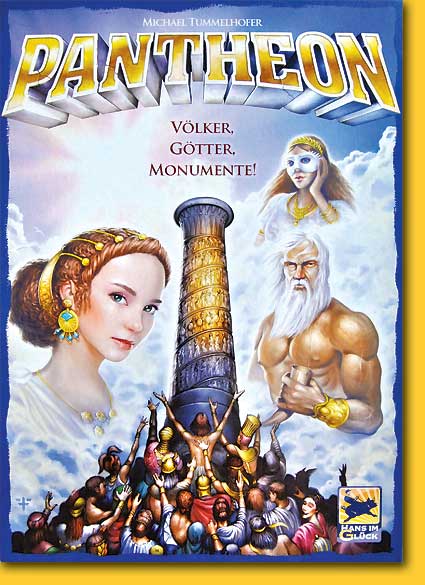 |
Oh, what coquettish creatures gods are! And we may turn up for the umpteenth time to curry favor with them as this is typically us, that we like to get fooled again and again. Casually we build some pillars -there’s no time for complete monuments- and all this must be sufficient to guarantee victory That is: if the gods are in favor of us, as they are known for their capriciousness!
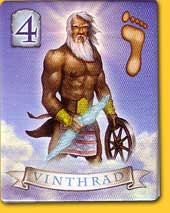 |
|
|
|
|
|
|
|
|
|
|
|
|
|
|
| In each of the six rounds an ancient civilization in the Mediterranean comes to life. Three to five loot tiles are placed around this civilization; it does not amount to much but it is the idea that counts, doesn’t it? At the same time with this civilization various gods tread into the limelight, one more than participating players, and by acquiring these gods and loot tiles players score points and collect potentials that they can use in the game. |
|
|
|
|
|
|
|
|
|
|
|
|
|
|
| x |
|
|
|
|
|
|
|
|
|
|
|
|
|
|
|
|
|
|
|
|
|
|
|
|
|
|
|
|
|
|
|
|
|
|
|
|
|
|
|
|
|
|
|
|
|
|
|
 |
|
| x |
|
|
| Each player starts the game with five cards, three pillars and four feet. Ehrm, feet? It may sound a bit strange, but it would be even crazier if players in the present ancient setting had to deal with rockets, we do have a point here don’t we? And with the hiking tours that will be made these feet are well within the context of the game. The rest of the pillars and feet go into the general supply and can be bought during the course of the game. |
|
|
|
|
|
|
|
|
|
|
|
|
|
|
| x |
The deck of cards, with a display of four cards, contains offering cards, money cards and feet cards. The gods can be adressed through the offerings. The permanent offerings, we gradually descend to the real world now, can be obtained with money.
When players buy a permanent offering, they add it to their core team. The permanent offering, depending on its strength, substitutes one or more offering cards of that kind when a god is bought, or better, bribed, as the gods all have their price: each god tile shows how many cards of how many different offerings must be played in order to persuade this god to work for that player.
 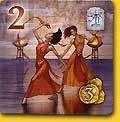 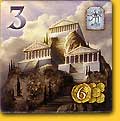 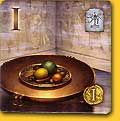 |
|
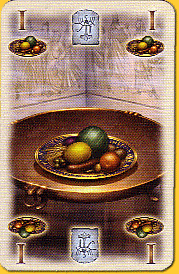 |
|
|
|
|
|
|
|
|
|
|
|
|
|
|
| x |
|
|
|
|
|
|
|
|
|
|
|
|
|
|
|
|
|
|
|
|
|
|
|
|
|
|
|
|
|
|
|
|
|
|
|
|
|
|
|
|
|
|
|
|
|
|
|
|
|
A permanent offering can be upgraded by paying the difference in money on both cards; upgrading immediately from no permanent offering at all or just one with strength ‘1’ to strength ‘4’ is allowed but almost impossible; a player usually will not have that much money simultaneously at hand. |
|
|
|
|
|
|
|
|
|
|
|
|
|
|
|
| x |
|
|
|
|
|
|
|
|
|
|
|
|
|
|
|
|
|
|
|
|
|
|
|
|
|
|
|
|
|
|
|
|
|
|
|
|
|
|
|
|
|
|
|
|
|
|
|
Each time when a god is bought, a player scores for it: just as many points as the current round. The god tile shows what they have to offer: discount when buying, additional hand cards, a virtual foot -we deal with gods, right?- one or more demigods, oh well, just consult the accompanying prospectus ‘Die Götter des Pantheon’ (‘The gods of Pantheon’)!
  
On the map loot tiles can be collected. Each player starts from the temple of the active civilization and places foot after foot on het grid of the board until he has reached and occupied such a tile. To realise this hike, feet cards must be played, equal to the amount of feet and pillars placed. With a loot tile points scan be scored, or peculiarities like a virtual foot –it’s nothing new anymore now, isn’t it?- which gives a discount on each following hiking tour. But also the loot tile that allows taking five additional hand cards is by no means to be sneezed at; a player standard only may take three cards -when he takes this action. |
|
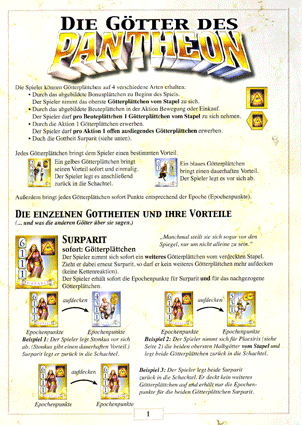 |
|
|
|
|
|
|
|
|
|
|
|
| x |
|
|
|
|
|
|
|
|
|
|
|
|
|
|
|
|
|
|
|
|
|
|
|
|
|
|
|
|
|
|
|
|
|
|
|
|
|
|
|
|
|
|
|
|
|
|
|
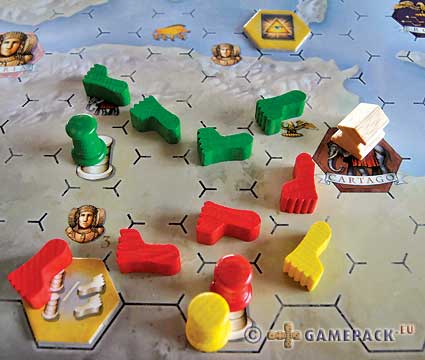 |
|
Apart from collecting loot tiles a player also may place a pillar on any of the marked positions by ‘walking’ to it with his feet; these pillars score from one to four points each, depending on the amount of pillars a player has placed. Up to two players may place a pillar on any one marked position, but the second player has to pay an additional foot card allowing him to place the pillar.
Summarized in a turn a player can do any one of the following: move, buy a god, take cards, or buy feet, pillars or permanent offerings -or upgrade one or more offerings. Also, when buying, feet or pillars a player already has in his personal supply can be placed on the board by paying one money per token -this way no feet cards are required. |
|
|
|
|
|
|
|
|
|
|
|
|
|
|
|
| x |
|
|
|
|
|
|
|
|
|
|
|
|
|
|
|
|
|
|
|
|
|
|
|
|
|
|
|
|
|
|
|
|
|
|
|
|
|
|
|
|
|
|
|
|
|
|
|
A round immediatley ends when the last god has been bought, or when the last loot tile of the active civilization is taken; the player left of the active player becomes the starting player in the following round.
After the third and the sixth round there is a score in which the pillars, but also the points of the demigods are scored; after the sixth round and subsequent score the player with the most points wins. |
|
|
|
|
|
|
|
|
|
|
|
|
|
|
|
| x |
|
|
|
|
|
|
|
|
|
|
|
|
|
|
|
|
|
|
|
|
|
|
|
|
|
|
|
|
|
|
|
|
|
|
|
|
|
|
|
|
|
|
|
|
|
|
|
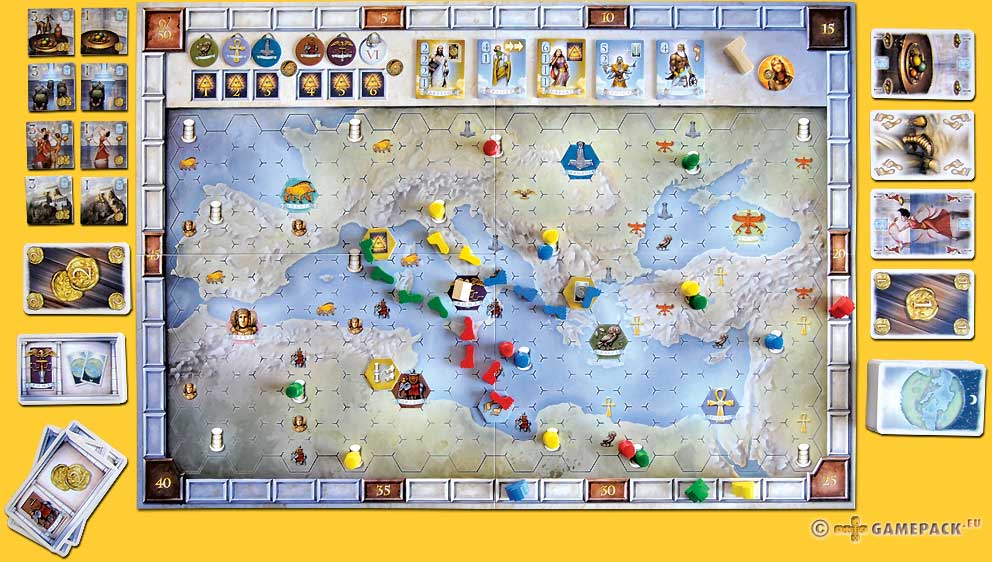 |
| x |
|
|
|
|
|
|
|
|
|
|
|
|
|
|
|
|
|
|
|
|
|
|
|
|
|
|
|
|
|
|
|
|
|
|
|
|
|
|
|
|
|
|
|
|
|
|
|
| x |
|
|
|
|
|
|
|
|
|
|
|
|
|
|
|
|
|
|
|
|
|
|
|
|
|
|
|
|
|
|
|
|
|
|
|
|
|
|
|
|
|
|
|
|
|
|
|
| x |
|
|
|
|
|
|
|
|
|
|
|
|
|
|
|
|
|
|
|
|
|
|
|
|
|
|
|
|
|
|
|
|
|
|
|
|
|
|
|
|
|
|
|
|
|
|
|
 |
|
|
|
|
|
|
|
|
|
|
|
|
|
|
|
|
|
|
|
|
|
|
|
|
|
|
|
|
|
|
|
|
|
|
|
|
|
|
|
|
|
|
|
At last the graphic designer got a chance in designing the logo for ‘Pantheon’ and prove that Word Art also counts, you arrogant Mac twits! And the box illustration shows a pillar that stands so crooked, that in the real world it would fall over any time! Further it strikes that a goddess has a peculiar and scary long neck! Nitpicking, admitted, as the rest of the illustrations on the cards and tiles are impressive and beautifully drawn. But back to the game itself!
Of course ‘Pantheon’ is mainly about collecting cards. And these will have to come in the right order and flavor. So, luck plays a major role, but it is mentioned before: the gods have a capricious character! This is show once more with the god ‘Surparit’ whose feature allows the player who bought it to draw a second god, free and for nothing, gratis so to speak, on the house, and on top of it also scores the points for this second god. Such a single action catapults a player in round six twelve points forward, nice for the player concerned, but the other players are left with the feeling: what made this Gladstone Gander / Gustav Gans earn it for? |
|
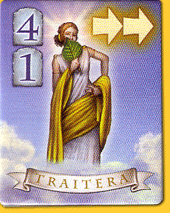 |
|
|
|
|
|
|
|
|
|
|
|
|
|
|
| x |
|
|
|
|
|
|
|
|
|
|
|
|
|
|
|
|
|
|
|
|
|
|
|
|
|
|
|
|
|
|
|
|
|
|
|
|
|
|
|
|
|
|
|
|
|
|
|
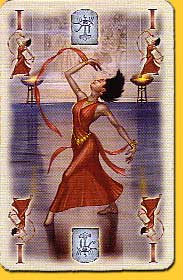 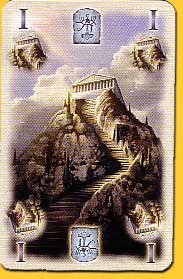 |
|
The starting player has a perfect position to claim a god or loot tile; when the same player or players finish off several rounds, it may occur that in a game one player never became the starting player -not fair, right?
Towards the end of the game it may happen that a player who is the last one in a round, never gets to playing his turn as all the gods or loot tiles fort hat round already have been claimed by previous players, wheter or not this was done with the aid of the god ‘Traitera’ who enables a player to make a second turn –this is too bad, isn’t it? |
|
|
|
|
|
|
|
|
|
|
|
|
|
|
|
|
| x |
|
|
|
|
|
|
|
|
|
|
|
|
|
|
|
|
|
|
|
|
|
|
|
|
|
|
|
|
|
|
|
|
|
|
|
|
|
|
|
|
|
|
|
|
|
|
|
It is amusing to notice that in ‘Pantheon’ this unbalance is so clear and undisguised; it almost could be regarded provocative! This unbalance sure is absent in other, more tactical games, right? Oh, ‘Age of Steam’ can be called balanced? Or ‘Acquire’?
A player who has managed to place all his twelve pillars on the board scores 48 points for them; yet this does not necessarily guarantees victory as a player with maybe only two pillars on the board may have compensated in buying demigods that might give him the edge in the two scores of the game.
Bonuses? Non present. Not for each collected loot tile a half point, not for each permanent offering level a quarter point, not for ‘I played with yellow’ a minus point; no points for nothing. Delightfully refreshing! |
|
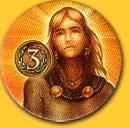 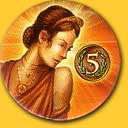  |
|
|
|
|
|
|
|
|
|
|
|
| x |
|
|
|
|
|
|
|
|
|
|
|
|
|
|
|
|
|
|
|
|
|
|
|
|
|
|
|
|
|
|
|
|
|
|
|
|
|
|
|
|
|
|
|
|
|
|
|
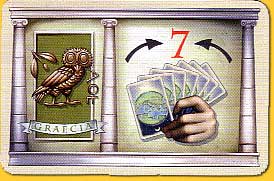 |
At the start of each round a civilization card is drawn that shows which civilization comes into action and with which special ability players start the round. Exchange feet for pillars, buying stuff for two money, draw two cards; i talmost always are nice things except for ‘Gallia’ and ‘Graecia’: each player has to reduce or refill his hand to seven cards. But this is good as it is, as it ricochets into the face of the hamster, and it is the badly needed bowl of rice for the pauper. Justice at last! |
|
|
|
|
|
|
|
|
|
|
|
|
|
|
|
|
| x |
|
|
|
|
|
|
|
|
|
|
|
|
|
|
|
|
|
|
|
|
|
|
|
|
|
|
|
|
|
|
|
|
|
|
|
|
|
|
|
|
|
|
|
|
|
|
|
‘Pantheon’ breathes the same atmosphere as ‘Stone Age’ from the same author who, maybe for tax or police investigation reasons, hides himself under the name Michael Tummelhofer*: it is a nice relaxed, cozy game with lots of freedom of action. And when all players have put on the same mind set, and have peace with the fact that things go very unfair at the gods, then all have a very enjoyable time!
© 2011 Richard van Vugt
Pantheon, Michael Tummelhofer, Hans im Glück, 2011 - 2 to 4 players, 10 years and up, 60-90 minutes
* Just kidding Herr Brunnhofer!
|
|
|
|
|
|
|
|
|
|
|
|
|
|
|
|
|
  |
|
|
|
|
|
|
|
|
|
|
|
|
|
|
|
|
|
|
|
|
|
|
|
|
|
|
|
|
|
|
|
|
|
|
|
|
|
|
|
|
|
|
|
  |
|
|
|
|
|
|
|
|
|
|
|
|
|
|
|
|
|
|
|
|
|
|
|
|
|
|
|
|
|
|
|
|
|
|
|
|
|
|
|
|
|
|
|
  |
Entertaining game with a bit too much luck and high frustration factor |
|
|
|
|
|
|
|
|
|
|
|
|
|
  |
|
|
|
|
|
|
|
|
|
|
|
|
|
|
|
|
|
|
|
|
|
|
|
|
|
|
|
|
|
|
|
|
|
|
|
|
|
|
|
|
|
|
|
  |
|
|
|
|
|
|
|
|
|
|
|
|
|
|
|
|
|
|
|
|
|
|
|
|
|
|
|
|
|
|
|
|
|
|
|
|
|
|
|
|
|
|
|
  |
|
|
|
|
|
|
|
|
|
|
|
|
|
|
|
|
|
|
|
|
|
|
|
|
|
|
|
|
|
|
|
|
|
|
|
|
|
|
|
|
|
|
|
|
|
|
|
| x |
|
|
|
|
|
|
|
|
|
|
|
|
|
|
|
|
|
|
|
|
|
|
|
|
|
|
|
|
|
|
|
|
|
|
|
|
|
|
|
|
|
|
|
|
|
|
|
| x |
|
|
|
|
|
|
|
|
|
|
|
|
|
|
|
|
|
|
|
|
|
|
|
|
|
|
|
|
|
|
|
|
|
|
|
|
|
|
|
|
|
|
|
|
|
|
|
 |
|
|
|
|
|
|
|
|
|
|
|
|
|
|
|
|
|
|
|
|
|
|
|
|
|
|
|
|
|
|
|
|
|
|
|
|
|
|
|
|
|
|
|
 |
|
|
|
|
|
|
|
|
|
|
|
|
|
|
|
|
|
|
|
|
|
|
|
|
|
|
|
|
|
|
|
|
|
|
|
|
|
|
|
|
|
|
|
| x |
|
|
|
|
|
|
|
|
|
|
|
|
|
|
|
|
|
|
|
|
|
|
|
|
|
|
|
|
|
|
|
|
|
|
|
|
|
|
|
|
|
|
|
|
|
|
|
 |
|
|
|
|
|
|
|
|
|
|
|
|
|
|
|
|
|
|
|
|
|
|
|
 |
|
|
|
|
|
|
|
|
|
|
|
|
|
|
|
|
|
|
|
|
|
|
|
|
|